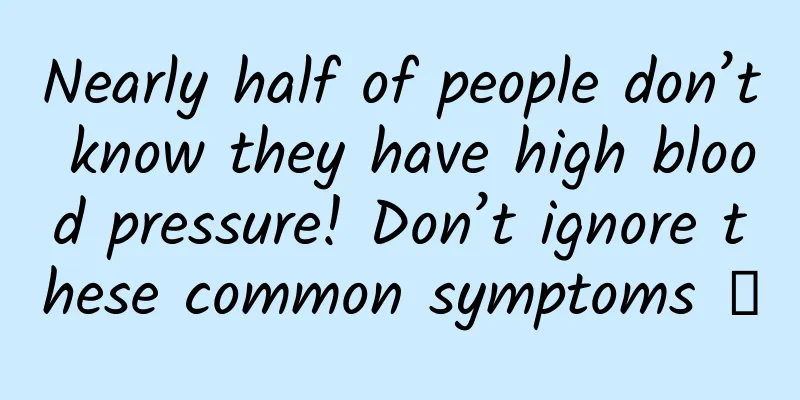Nearly half of people don’t know they have high blood pressure! Don’t ignore these common symptoms →

|
Review expert: Peng Guoqiu, deputy chief physician of the Fourth Medical Center of the General Hospital of the Chinese People's Liberation Army May 17th is the 20th World Hypertension Day. According to the "China Cardiovascular Health and Disease Report 2022", there are 245 million patients with hypertension in China, but the awareness rate of patients with hypertension is only 51.6%. In other words , nearly half of patients with hypertension do not know that they have hypertension. In addition, do not think that hypertension is an old age disease, more and more young people are suffering from hypertension. According to the "Report on the Nutrition and Chronic Disease Status of Chinese Residents (2020)" released by the National Health Commission, the prevalence of hypertension among residents aged 18 and above in my country is 27.5%, among which the prevalence of hypertension among residents aged 18-44, 45-59 and 60 and above is 13.3%, 37.8% and 59.2% respectively. However, many young people insist that "as long as I don't have a physical examination, I'm not sick". They are sick without knowing it, and often think that they are just too tired and just need to rest. Little do they know that the red light of high blood pressure has been turned on! Image source: Health Times Some common symptoms of high blood pressure Do you know what the "signals" of high blood pressure are? These 5 common symptoms may be manifestations of high blood pressure. Check if you have any! 1. Dizziness: The most common symptom of hypertension. Some symptoms are persistent, while others are transient. They are more obvious when there is a sudden change in body position (such as squatting or standing up). 2. Easy to get tired: High blood pressure can also cause weakness and fatigue, because high blood pressure can affect heart function, leading to hypoxia of various tissues and organs of the body, causing fatigue. 3. Palpitations and insomnia: Palpitations and insomnia are common in patients with hypertension. Insomnia often manifests as difficulty falling asleep, early awakening, restless sleep, nightmares, and easy awakening. 4. Limb numbness: Hypertensive patients sometimes experience limb numbness, mainly with soreness, muscle tension, numbness, etc. in the fingers, toes, and skin. Some patients often feel that their fingers are not flexible. 5. Memory loss: Long-term high blood pressure can lead to hardening of the cerebral arteries and insufficient blood supply to the brain, which can cause memory loss. Therefore, the most important thing to prevent high blood pressure is to detect high blood pressure in time and measure blood pressure regularly. Many people make judgments based on feelings and experience, thinking that if they don't feel anything, there is no problem. In fact, this is very dangerous. Hypertensive patients can measure their blood pressure once a day in the morning and evening; for healthy people aged 50, measure blood pressure during annual physical examinations or once every three months. Image source: Qianku.com How to determine whether you have high blood pressure? Blood pressure in the population is continuously normally distributed, that is, the blood pressure values fluctuate at different times of the day. In fact, there is no clear dividing line between high blood pressure and normal blood pressure, and the standard is determined based on clinical and epidemiological data. Therefore, high blood pressure does not necessarily mean that you have hypertension. On May 6, 2020, the International Society of Hypertension (ISH) released the globally applicable "ISH 2020 International Hypertension Practice Guidelines". The new "Guidelines" recommend diagnosing hypertension by performing 2-3 office measurements every 1-4 weeks, and have ruled out other factors that interfere with the temporary increase in blood pressure. On November 13, 2022, the "Chinese Hypertension Clinical Practice Guidelines" jointly formulated by the National Center for Cardiovascular Disease, the Chinese Medical Association, the Cardiovascular Disease Branch of the Chinese Medical Association and other academic institutions were officially promulgated, recommending that the diagnostic criteria for hypertension in adults in my country be lowered from ≥140/90mmHg to ≥130/80mmHg. The National Health Commission subsequently announced that regarding the diagnostic criteria for hypertension, the publicity and education points, prevention and treatment guidelines, and clinical pathways issued by the national health administrative departments in 2005, 2010, and 2017 all clearly stated that the diagnostic criteria for adult hypertension is blood pressure exceeding 140/90 mmHg three times on different days. At present, the country has not adjusted the diagnostic criteria for adult hypertension. In other words, the content in the published guidelines regarding "recommending to lower the diagnostic threshold for hypertension in adults in my country to 130/80 mmHg" is the result of expert research and is of reference value, but cannot be used as a national disease diagnostic standard. Therefore, the diagnostic standard for hypertension in adults in my country is still ≥140/90 mmHg, but people with blood pressure exceeding 130/80 should still be vigilant. Image source: Baidu Images Hypertension is the number one factor that damages blood vessels Hypertension can destroy the function of the vascular endothelium, reduce vascular elasticity, and allow lipids to enter the arterial wall and damage the endothelium, forming scar-like hyperplasia; this in turn promotes atherosclerosis and thrombosis, damaging target organs such as the heart, brain, kidneys, and eyes, and causing transient ischemic attacks, stroke, dementia, heart failure, angina pectoris, myocardial infarction, kidney disease, retinopathy, etc. Increased blood pressure impacts blood vessels, causing them to "deform"↓ Long-term impact damages the vascular endothelium↓ Scar-like hyperplasia forms at the damaged site↓ Platelets accumulate on the surface of damaged tissue↓ Thrombosis gradually forms↓ Image source: Life Times In 2022, a study conducted by Chinese scholars on nearly 200,000 adults aged 40 and above in my country and published in The Lancet also found that among the 12 common modifiable risk factors for cardiovascular disease, the strongest risk factor for participants to develop cardiovascular disease was high blood pressure. Among them, people aged 40 to 75 should prevent high blood pressure the most. If high blood pressure can be completely controlled, their cardiovascular events can be reduced by 52.4%. How should patients with hypertension intervene in their lifestyle? 1. Control your weight and try to keep your BMI within 24kg/㎡; 2. Balanced nutrition, balanced diet, and fresh vegetables and fruits every day; 3. Eat less sodium salt, and strive to consume less than 5g of salt per day; 4. Drink less and don’t smoke; 5. Increase physical exercise. Exercise is beneficial for reducing weight and improving insulin levels, improving cardiovascular regulation and adaptability, and stabilizing blood pressure levels; 6. Maintain a relaxed and happy lifestyle and avoid excessive stress. Image source: Qianku.com Does all high blood pressure need treatment? All diagnosed high blood pressure requires treatment. Lifestyle changes are important for controlling hypertension, but if lifestyle improvements alone are no longer able to keep blood pressure normal, then you must rely on the assistance of antihypertensive drugs. Many young patients with hypertension are afraid that "once they take medicine, they can't stop." But it should be noted that mild to moderate hypertension may not have obvious symptoms, and humans will develop a certain tolerance to the slow increase in blood pressure, but this process is also accompanied by the slow damage of multiple target organs. For example, the heart will slowly become larger and weaker due to the increased burden on the heart; long-term high pressure in the arteries will cause damage, making atherosclerosis more likely to occur, leading to coronary heart disease, stroke and chronic kidney disease. Therefore, people with no symptoms of high blood pressure also need to take medication, and young patients with high blood pressure especially need to use antihypertensive drugs to control blood pressure below 130/80 (note: lower than the normal standard of 140/90) in order to delay the damage caused by high blood pressure. Image source: Baidu Images What should patients with hypertension pay attention to? In addition to the lifestyle interventions introduced above, treatment principles for hypertensive patients also include the use of antihypertensive drugs, target values for blood pressure control, and the control of multiple cardiovascular risk factors. The use of antihypertensive drugs for treatment should follow four principles: starting with a low dose, giving priority to long-acting preparations, combination therapy and individualization. Hypertensive patients need to control their blood pressure within a reasonable range through long-term antihypertensive treatment. After receiving effective treatment to control blood pressure, each patient still needs to adhere to the treatment and should not stop treatment at will or change the treatment plan frequently. Most patients return to the blood pressure level at the onset of the disease after stopping antihypertensive drugs for half a year. At present, the general blood pressure control target value is less than 140/90 mmHg. However, the blood pressure control target value for patients with diabetes, chronic kidney disease, heart failure and coronary heart disease should be less than 130/80 mmHg. For elderly patients with systolic hypertension, systolic blood pressure needs to be controlled below 150 mmHg, and can be reduced to 140 mmHg if there is still room for improvement. It is not the case that the sooner the blood pressure is lowered to the target value, the better. Young patients with a shorter course of illness can reach the target value faster; however, for the elderly, patients with a longer course of illness or those with multiple organ complications, a slower blood pressure lowering speed is appropriate. Therefore, although antihypertensive treatment can control blood pressure within the normal range, other risk factors will also have an important impact on prognosis. Therefore, it is also necessary to take into account multiple cardiovascular risk factors such as sugar metabolism, lipid metabolism, and uric acid metabolism. |
<<: Hypertension is targeting young people, what should we do?
>>: Hand, foot and mouth disease is coming, parents should take these precautions!
Recommend
Can I have sex in the first month of pregnancy?
A woman's body is the most unstable in the fi...
How should I treat abdominal pain during menstruation?
Women generally feel a little uncomfortable durin...
What is the normal range of amniotic fluid index at 35 weeks?
The development of a baby at 35 weeks is consider...
Is it necessary to have a uterine curettage if lochia is not completely gone?
Although today's medical science is very adva...
What are the symptoms of gynecological inflammation?
Gynecological inflammation is one of the more com...
What are the effects of cervical mucosal shedding?
The uterus and other tissues are reproductive org...
Is it good for pregnant women to eat guava?
Guava is rich in nutrition. Eating it can improve...
Women are most afraid of liver depression
Women tend to be more emotional and easily troubl...
How many days do you need to rest after an abortion?
Speaking of abortion, it is very common and is fa...
What to do if makeup remover gets into eyes
Every girl loves beauty, and most girls in their ...
The best way to protect your skin, pay attention to these skin care methods
All female friends want to have fair, moist and f...
Can I breastfeed if I have itching on my body during breastfeeding?
The breastfeeding period is also a very important...
What kind of pan is suitable for making hawthorn cake? Can a non-stick pan be used to make hawthorn cake?
We all know that hawthorn cake is a popular pastr...
Woman feels pain when finishing urination
Women are very susceptible to bacteria, which is ...









